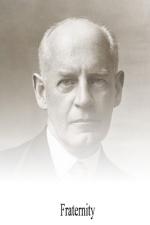She was a little taller than Cecilia, her figure rather fuller and more graceful, her hair darker, her eyes, too, darker and more deeply set, her cheek-bones higher, her colouring richer. That spirit of the age, Disharmony, must have presided when a child so vivid and dark-coloured was christened Bianca.
Mr. Purcey, however, was not a man who allowed the finest shades of feeling to interfere with his enjoyments. She was a “strikin’-lookin’ woman,” and there was, thanks to Harpignies, a link between them.
“Your father and I, Mrs. Dallison, can’t quite understand each other,” he began. “Our views of life don’t seem to hit it off exactly.”
“Really,” murmured Bianca; “I should have thought that you’d have got on so well.”
“He’s a little bit too—er—scriptural for me, perhaps,” said Mr. Purcey, with some delicacy.
“Did we never tell you,” Bianca answered softly, “that my father was a rather well—known man of science before his illness?”
“Ah!” replied Mr. Purcey, a little puzzled; “that, of course. D’you know, of all your pictures, Mrs. Dallison, I think that one you call ’The Shadow’ is the most rippin’. There’s a something about it that gets hold of you. That was the original, wasn’t it, at your Christmas party—attractive girl—it’s an awf’ly good likeness.”
Bianca’s face had changed, but Mr. Purcey was not a man to notice a little thing like that.
“If ever you want to part with it,” he said, “I hope you’ll give me a chance. I mean it’d be a pleasure to me to have it. I think it’ll be worth a lot of money some day.”
Bianca did not answer, and Mr. Purcey, feeling suddenly a little awkward, said: “I’ve got my car waiting. I must be off—really.” Shaking hands with all of them, he went away.
When the door had closed behind his back, a universal sigh went up. It was followed by a silence, which Hilary broke.
“We’ll smoke, Stevie, if Cis doesn’t mind.”




